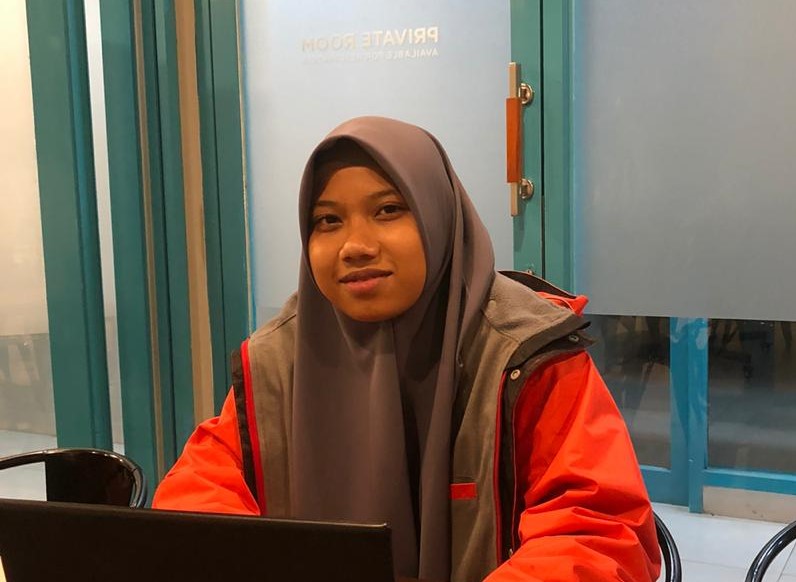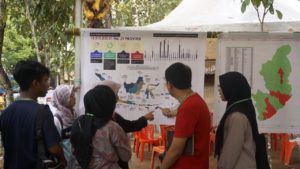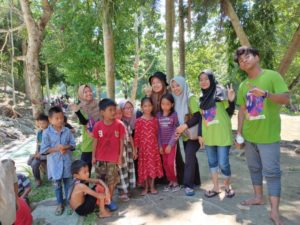Youth Ambassadors: Adapting the youth participatory model in Indonesia
The Youth Advisor Board (YAB) model was designed as a key part of the EYW program to ensure that the project is youth-led. In Indonesia, the YAB model was adapted into a Youth Ambassador model called Duta Muda Berdaya Berkarya. Its main focus is to enhance youth capacity for advocacy and increase relevant skills for employment and entrepreneurship, as well as encourage youth to facilitate advocacy activities between EYW, the government, and other stakeholders.
There are 14 Youth Ambassadors representing seven districts across three provinces, with one young woman and one young man per district. Youth Ambassadors are aged between 15-29, are a public figure or focal point in their community or network, have a positive image, and have a track record on entrepreneurship or social issues such as climate change and sexual and reproductive health and rights, and are passionate about entrepreneurship or social issue. They participate and contribute in influencing and campaigning activities on youth and social issues at peer, community, and national levels. Youth Ambassadors are especially encouraged to address youth empowerment and employment issues in their community, using their network to identity potential stakeholders with whom they can engage. This way, they can inspire other young people and stakeholders.

Monita (21), Youth Ambassador and entrepreneur from South Sulawesi. Read her story
What is the role of a Youth Ambassador?
 The Youth Ambassadors support the thinking and work of the projects, especially in influencing and campaigning, by acting as:
The Youth Ambassadors support the thinking and work of the projects, especially in influencing and campaigning, by acting as:
- A ‘sounding board’ for activities, strategies and decisions related to the project;
- A source of creativity and ideas of strategies and approaches for better engagement and inspiring young people at various stages of the project;
- A panel of young people to engage in the monitoring and evaluation of plans, work, and ideas for the project, especially related to engaging youth and ensuring their voices are presented;
- A challenging voice and critical eye to ensure clear commitment and action by EYW that embraces the spirit and aim of the broader program to engage directly with youth as active citizens in fulfilling their rights;
- A co-creator of spaces that facilitate opportunities for youth to fully engage in decisions and work that directly impacts their lives.
How are Youth Ambassadors prepared for this role?
So far, the youth have received online trainings on gender equality, climate change, youth participation, design tools application, strategic development, and copywriting. They will also be trained on online marketing, advocacy and policy, organic farming, and digital skills (including UI/UX).

- Training on gender equality was delivered to provide youth with a better understanding of gender and raise their awareness about the issues. Through the training, they learn about reproduction, gender, gender roles, and gender injustice. They were assigned to analyze and observe gender inequality in their community and/or media after the training.
- Youth were invited to observe the impact of climate change in their environment and shared their ideas on how to participate in fighting climate change.
- Youth participation training discussed the impact of meaningful youth participation and how it can be achieved. The concept was new for the youth as they had never of the expectation to be critical and take active roles in their community. After the training, youth were assigned to observe youth participation in Karang Taruna (a youth organization in their village), PIK-R (a youth counselling and information center), and a university.
- Design Tool Application training informed youth of easy-to-use design applications that they can use for their campaign activities. Youth also got information about free to use icons and characters for their design.
- The Strategic Development Tool guides youth to plan their activities by using SMART (Specific, Measurable, Achievable, Realistic, and Timely) and added elements of gender, climate change, and, youth participation.
- Several trainings were given based on youth demands. One of these was copywriting training, where youth had the opportunity to learn copywriting and create content to promote their business on Instagram. The trainer also provided feedback.
Due to the COVID-19 pandemic, most activities were conducted online, especially training, meetings and workshops. The meetings are conducted in small online groups, and the campaigning workshop is conducted in a big online group using a participatory approach (through onlime tools such as Mentimeter.com and jamboard).
Methodology
The Youth Ambassador Model was established in mid-February 2020. This model was selected after considering feedback from partners that the Youth Ambassador terminology will be suitable for our context and youth in Indonesia. The model was newly developed for the project and was designed to provide input from youth across the project. For the positions, 38 youth applicants were screened that were submitted by our partners from West Java (Indramayu), South Sulawesi (Maros, Pangkajene dan Kepulauan, and Barru) and Southeast Sulawesi (Kendari, Wakatobi, and Baubau).
On October 2020, we disseminated a survey to Youth Ambassadors to receive their input on what training they needed. We provided a selection of topics related to the future of work that they can use to improve their business, such as copywriting and online marketing.
Results
- So far, a total of 14 young people are involved in the YAB, representing seven districts across three provinces.
- The members that have participated in the capacity building sessions show stronger leadership skills and knowledge which help them being stronger representatives of other youth voices.
- Through the YAB the content and main messages were gathered for the International Women's Day campaign but also for the Future of Work campaign.
- Young people within EYW are actively involved within advocacy throughout the program, such as engaging them in collaborations with governments. This teaches them how to work with important stakeholders in order to achieve their needs.
Sustainability
The activities that are a part of this model are being adjusted to focus more on how the model can contribute to the income generating-activities of young people. There are also plans to increase the capacity for remote monitoring on the influencing and advocacy activities of youth Ambassadors to respective government stakeholders. The youth ambassadors are also linked with the Youth Hubs in targeted areas, which will help deliver information on related social and economic empowerment in the future to youth directly.
Oxfam and partner staff are collaborating to ensure the importance of the YAB and gather further input on how to use this youth group. Through the local partners, youth will be linked to important stakeholders, such as local governments. Youth will be able to supervise the project, support the design and implementation of activities, especially campaign and influencing. The model also allows them to ensure that their voices are represented and valued.
To learn more about the soft and life skills of the EYW project Click Here
